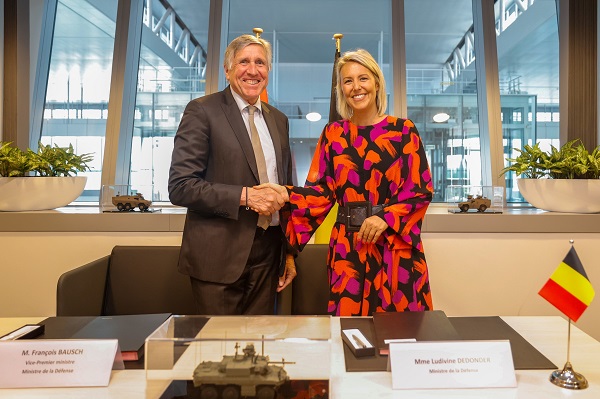 (L-R) François Bausch, Luxembourg's Deputy Prime Minister and Minister of Defence; Ludivine Dedonder, Belgium's Minister of Defence;
Credit: MAEE
(L-R) François Bausch, Luxembourg's Deputy Prime Minister and Minister of Defence; Ludivine Dedonder, Belgium's Minister of Defence;
Credit: MAEE
On Thursday 15 June 2023, Luxembourg's Deputy Prime Minister and Minister of Defence, François Bausch, and Belgium's Minister of Defence, Ludivine Dedonder, signed a cooperation agreement concerning the establishment and the joint operation of the binational reconnaissance battalion.
According to Luxembourg's Directorate of Defence, the Belgian-Luxembourg reconnaissance battalion will be a concrete example of the implementation of NATO and European Union concepts aimed at promoting enhanced multinational cooperation.
The establishment and joint operation of the battalion will be carried out in three phases:
- Initial phase, focused on Marche-en-Famenne for the Belgian Defence and Diekirch for the Luxembourg Army, with an initial integration in Marche-en-Famenne;
- Intermediate phase, marked by the gradual establishment of the binational battalion in Arlon and by the gradual commissioning of the facilities in Luxembourg;
- Final phase, by 2030, marked by maximum integration, with Arlon as the centre of gravity and with a significant footprint in Luxembourg.
The establishment of the binational battalion will be led by a steering committee co-chaired by representatives of the Chief of Staff of the Luxembourg Army and the Belgian Chief of Defence. Decisions relating to the establishment and operation of the binational battalion, in particular those having a financial impact, will be taken by mutual agreement between the two parties.
The structure and organisation of the binational battalion is expected to make it possible to meet the capability objectives proposed to Belgium and Luxembourg within the framework of NATO's defence planning process and will be consistent with the choices made within the framework of the strategic partnership and the cooperation set up between Belgium and France in the field of land mobility on the occasion of the renewal of their respective motorised components (CaMo).
The binational battalion will be trained, equipped and capable of carrying out a wide range of missions, in a national, multilateral framework, or in support of an international or regional organisation, such as NATO, the EU or the United Nations. The Belgian and Luxembourg Defence have undertaken to contribute equitably to the personnel needs of the binational battalion, which is over 700 strong.
"Today we begin a key step in military cooperation, which builds on our valuable experiences gained over the years as part of the binational A400M unit. This battalion will be of capital importance in terms of the transformation of the Luxembourg Army, perfectly in response to the expectations of NATO or the EU," stated Minister Bausch. "This signature sends a strong signal to our allies and demonstrates our commitment, our solidarity as well as our resolution to take regional cooperation to a new dimension."
Minister Dedonder added: "The creation of our binational reconnaissance battalion with the Luxembourg armed forces is a continuation of the excellent defence cooperation that our two countries already enjoy today. Trust, cooperation and interoperability are the keys to successful partnerships. Our binational A400M unit and the Luxembourg students of the Royal Military Academy are perfect examples of this. Our two countries were the basis of the European Union and are now working together to further develop [European defence] for a stronger and safer Europe within NATO."
Note that Ministers Bausch and Dedonder signed a letter of intent for the creation of a Belgian-Luxembourg reconnaissance battalion on 31 August 2021. Then on 25 January 2022, the Ermesinde binational working group, which has the mission of developing the concepts for the establishment and joint operation of the future Belgian-Luxembourg reconnaissance battalion, was created. 13 October 2022 marked the signing of the declaration of intent concerning the implementation of the binational reconnaissance battalion.









